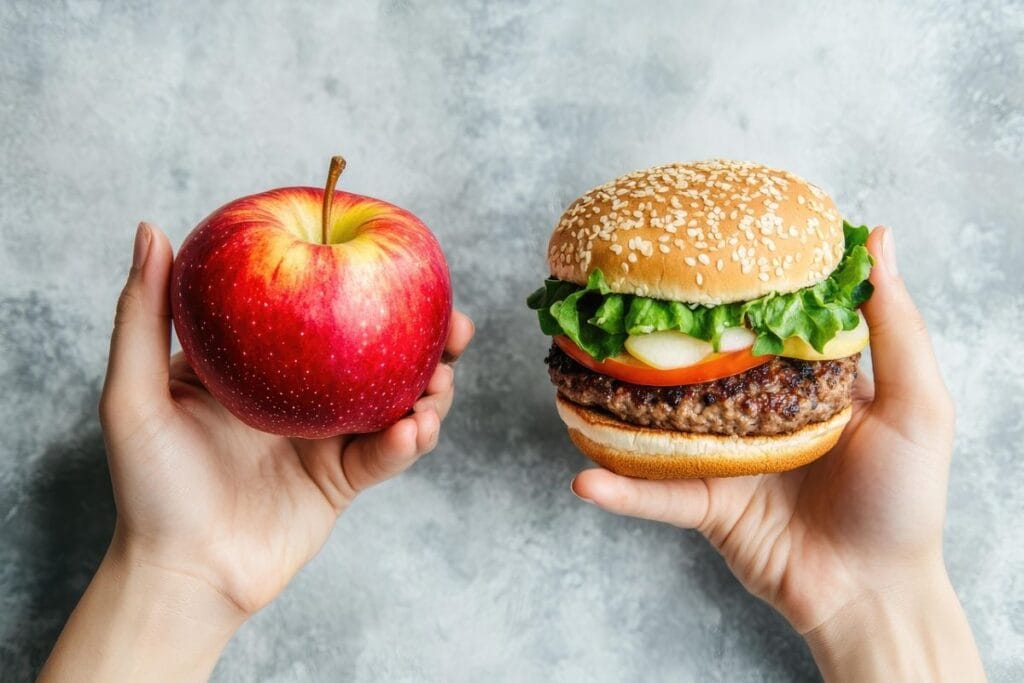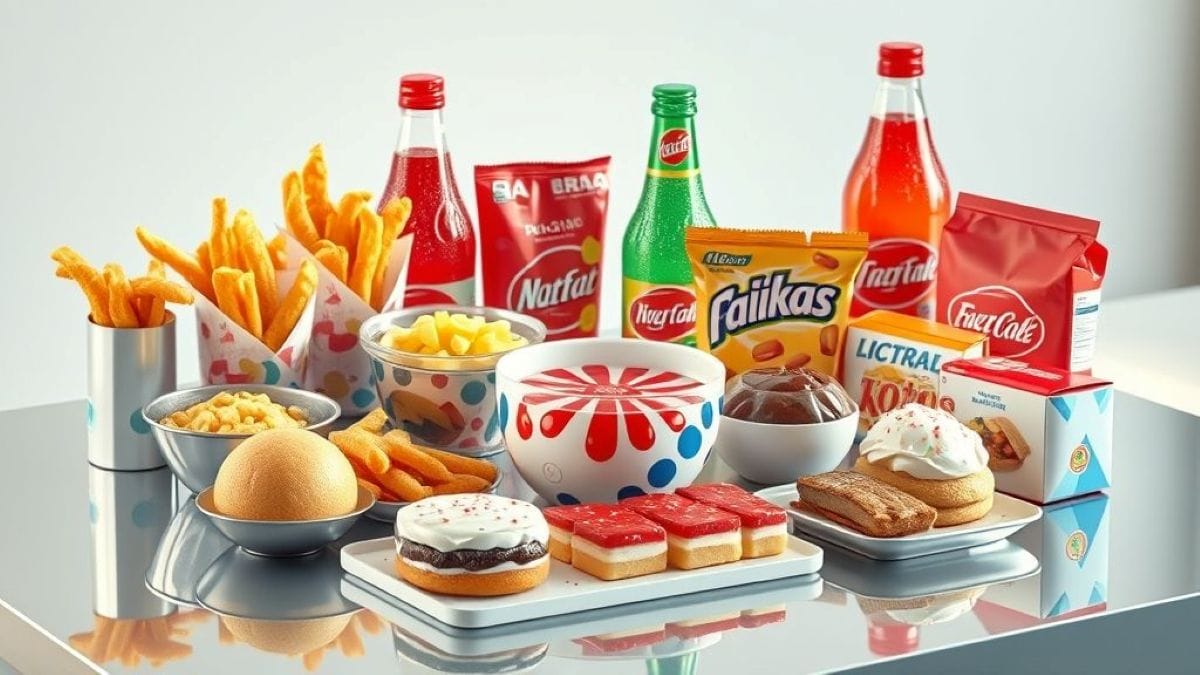
Every bite we take is a choice — one that can heal or slowly harm our body. Fresh, natural foods fuel us with real strength, while manufactured snacks and sugary drinks silently drain our health. The danger? These processed foods are everywhere, making it easy to fall into unhealthy patterns without even realizing it. In this blog, we uncover the truth about natural vs. manufactured foods, how they affect your body, and the small but powerful steps you can take to protect yourself and your family’s future.
Why Processed Food is Everywhere
Chips, soda, instant noodles, frozen meals — they’re quick, cheap, and taste good. No wonder processed foods are everywhere in our daily lives. But here’s the silent truth: behind the convenience, these foods often hide extra sugar, salt, unhealthy fats, and artificial ingredients that can harm your body over time.
According to the U.S. National Institutes of Health, more than 60% of calories in the average American diet come from processed or ultra-processed foods. This habit is linked to obesity, diabetes, heart disease, and even some cancers. And it’s not just an American problem — processed foods are spreading worldwide, creating the same health risks in many countries.
In this blog, we’ll answer common questions people ask every day:
- Is processed food really bad for health?
- Can it cause obesity, diabetes, or even cancer?
- Are these foods safe for children?
- What happens if you stop eating them?
By the end, you’ll not only understand the dangers but also discover simple food swaps that can make a big difference in your health.
What Exactly Are Processed Foods?
Not all processing is bad. Even washing and cutting vegetables is technically “processing.” The real problem begins when foods are manufactured in factories with chemicals, preservatives, and additives that change their natural nutrition.
Here’s how experts usually classify foods:
1. Minimally Processed Foods
- Slight changes, but still close to natural.
- Examples: frozen vegetables, milk, packaged rice, flour.
2. Processed Foods
- Ingredients are added for taste or longer shelf life.
- Examples: bread, cheese, breakfast cereals, canned beans.
3. Ultra-Processed Foods (The Silent Threat)
- Heavily manufactured with artificial flavors, colors, stabilizers, and preservatives.
- Examples: chips, cookies, soda, instant noodles, processed meats.
- These foods are linked to weight gain, diabetes, and heart problems.
4. Food Fermentation vs Manufactured Foods
- Food Fermentation (like yogurt, kimchi, idli batter, sauerkraut) is a natural process that can be healthy for the gut.
- Manufactured Foods, on the other hand, are made in bulk with artificial methods — think packaged snacks, sugary drinks, instant meals. It’s wise to cut back on these as much as possible.
In short: Fresh > Minimally Processed > Processed > Ultra-Processed. The farther away food is from its natural form, the less healthy it becomes
Health Concerns of Eating Too Much Processed Food
Is Processed Food Bad for Health?
Yes — eating too much processed food is harmful. Most of these foods are loaded with added sugar, salt, unhealthy fats, and preservatives. According to the Centers for Disease Control and Prevention (CDC), diets high in processed foods are linked to obesity, high blood pressure, and poor heart health.
While having them occasionally is fine, making them a daily habit slowly damages your body from the inside.
What Diseases Are Linked to Processed Foods?
The more ultra-processed foods you eat, the higher your risk of lifestyle diseases. Research published in the British Medical Journal found strong links between ultra-processed food consumption and:
- Obesity – due to excess calories and sugar.
- Type 2 Diabetes – caused by insulin resistance from high sugar intake.
- Heart Disease & Stroke – because of trans fats, excess salt, and poor nutrition.
- Digestive Issues – low in fiber, leading to poor gut health.
Processed foods high in sugar and refined carbs are strongly linked with rising diabetes cases worldwide, especially in India, where lifestyle changes are making the condition more common. To understand the myths, facts, and practical tips for living healthy with this condition, check out this detailed guide on Diabetes in India: Myths, Facts & How to Stay Healthy.
Does Processed Food Cause Cancer?
The World Health Organization (WHO) has classified processed meats (like bacon, hot dogs, sausages) as Group 1 carcinogens, which means there is strong evidence they can cause cancer, especially colorectal cancer.
Ultra-processed foods in general are not proven to “directly” cause cancer, but studies show that eating them regularly increases the risk because they promote obesity, inflammation, and poor metabolic health.
Can Processed Food Cause Obesity or Diabetes?
Yes. Processed foods are designed to be tasty and addictive. They are high in sugar and refined carbs, which spike blood sugar quickly. Over time, this leads to:
- Weight gain (because the calories add up fast).
- Insulin resistance → a key factor in type 2 diabetes.
For example, a single can of soda contains about 10 teaspoons of sugar — far above the daily healthy limit.
Why Is Junk Food Harmful?
“Junk food” is another name for many ultra-processed foods. It’s harmful because it:
- Offers empty calories (lots of energy but little nutrition).
- Causes sugar crashes and low energy after eating.
- Weakens the immune system due to lack of vitamins and minerals.
- Can even affect mental health — studies link high junk food intake with depression and anxiety.
In short: Junk food gives quick pleasure but leaves lasting damage.
Family & Kids: The Hidden Risk at Home
Are Processed Foods Safe for Children?
Not really. While an occasional treat is fine, regular intake of processed foods can harm children’s growth. According to the American Academy of Pediatrics (AAP), diets high in processed snacks and sugary drinks are linked to childhood obesity, early diabetes, and even high blood pressure.
Kids’ bodies are still developing, so they are more sensitive to excess sugar, salt, and artificial additives. A packet of chips or a sugary drink may seem harmless, but if it becomes a daily habit, it can lead to long-term health problems.
Processed Food and Brain Development in Kids
Children’s brains need nutrients like omega-3 fatty acids, protein, vitamins, and minerals to develop properly. Processed foods usually lack these nutrients and are loaded with sugar and unhealthy fats.
Studies in The Lancet Child & Adolescent Health journal show that kids who consume a lot of junk food may struggle with memory, focus, and learning. Over time, this can affect academic performance and overall development.
Healthy Alternatives to Processed Snacks for Kids
The good news? Kids can still enjoy tasty snacks — without the unhealthy side effects. Here are some smart swaps parents can try:
- Instead of chips → Air-popped popcorn or roasted chickpeas.
- Instead of candy → Fresh fruit slices or raisins.
- Instead of packaged cookies → Homemade oats cookies or banana muffins.
- Instead of soda → Fruit-infused water or fresh lemonade.
- Instead of packaged juices → Whole fruits (which have fiber).
These alternatives not only taste good but also provide fiber, vitamins, and energy kids truly need.
Why Parents Should Pay Extra Attention
Children often copy their parents’ eating habits. If processed foods dominate the home, kids will grow up thinking that chips, cookies, and sodas are “normal everyday foods.” By making small changes — like keeping fruits on the table or packing healthy snacks in lunch boxes — parents can build lifelong healthy habits for their children.
Everyday Habits: Spotting Ultra-Processed Foods in Your Diet
How Much Processed Food Is Too Much?
A little processed food now and then is okay — but the problem begins when it becomes part of your daily meals. Nutrition experts often suggest following the 80/20 rule: aim for 80% fresh or minimally processed foods, and allow 20% for occasional treats.
If most of your calories come from packaged snacks, instant noodles, or sugary drinks, that’s too much. A safe balance is to make fresh food your everyday choice and keep processed foods as rare exceptions.
Is Bread, Cereal, or Noodles Processed Food?
Yes, but not all are equally harmful. Let’s break it down:
- Bread: Whole grain or multigrain bread can be healthy in moderation, but white bread (refined flour) is more processed and offers little nutrition.
- Cereal: Oats and unsweetened cereals are fine, but colorful sugary cereals are ultra-processed.
- Noodles: Homemade noodles or whole wheat pasta are better choices. Instant noodles, on the other hand, are ultra-processed with added salt, oils, and preservatives.
Rule of thumb: the fewer ingredients on the label, the healthier the food usually is.
Which Processed Foods Should I Avoid?
Some foods are more harmful than others. According to the Harvard School of Public Health, here are the worst offenders:
- Sugary drinks (soda, packaged fruit juices).
- Processed meats (hot dogs, sausages, bacon).
- Packaged snacks (chips, cookies, crackers).
- Instant noodles and ready-to-eat meals.
- Candy and chocolate bars high in sugar.
These foods should be limited as much as possible, especially if eaten daily.
Processed vs Fresh Foods: A Simple Comparison
| Fresh Food | Processed/Ultra-Processed Food |
| Fresh apple | Packaged apple juice with added sugar |
| Home-cooked rice & vegetables | Instant fried rice packet |
| Plain yogurt (curd) | Flavored yogurt with artificial sweeteners |
| Roasted nuts | Packaged salty chips |
This simple table shows how a small swap can turn an unhealthy meal into a healthier one without losing taste.
Awareness & Curiosity – What Really Happens Inside Your Body
When you eat processed or ultra-processed foods, your body goes through changes that may not be obvious right away. At first, you might only notice the taste—salty chips, sweet sodas, or instant noodles. But behind the scenes, your body is working hard to process all the extra sugar, salt, fat, and additives.
1. Blood Sugar Spikes
Processed foods are often stripped of fiber. Without fiber, sugar enters your blood very quickly. This causes a sudden spike in blood sugar, giving you short bursts of energy. But soon after, your sugar levels crash, making you feel tired, hungry, and craving more junk food. Over time, this up-and-down cycle can increase the risk of type 2 diabetes.
2. Extra Stress on the Heart
High amounts of sodium (salt) in packaged foods raise your blood pressure. When this happens often, your heart has to work harder, which increases the chances of heart disease and stroke later in life.
3. Gut Health Gets Weaker
Your gut is full of “good bacteria” that keep digestion smooth and boost immunity. Processed foods often lack natural nutrients and contain artificial ingredients that hurt this healthy balance. This can lead to poor digestion, bloating, and even long-term gut problems.
4. Hidden Fat Storage
Ultra-processed foods are designed to taste so good that they make you eat more than you need. The extra calories often turn into stored fat, especially around your belly. Over time, this can lead to obesity and related diseases.
5. Brain & Mood Changes
Research shows that diets high in processed foods may affect your brain health too. They can lower concentration, increase anxiety, and even contribute to depression. This is partly because your brain is sensitive to blood sugar changes and relies on healthy nutrients to function well.
In simple words: Processed foods may taste good in the moment, but inside your body, they silently create stress for your blood, heart, gut, and even your brain.
Safer & Smarter Food Choices – Small Steps, Big Wins
The good news? You don’t have to give up every packaged snack to stay healthy. The secret is making small, smarter food swaps that add up over time. Even simple choices can protect your body and boost your energy.
Easy Swaps for Everyday Life
- Choose whole over processed: Pick fresh fruits instead of candy bars, or roasted nuts instead of chips.
- Go for whole grains: Swap white bread or instant noodles with brown rice, whole wheat bread, or oats.
- Check the label: Look for foods with fewer ingredients and no hard-to-pronounce chemicals.
- Hydrate smartly: Replace sodas or energy drinks with water, coconut water, or fresh lemonade.
- Cook more at home: Homemade meals often have less sugar, salt, and oil compared to restaurant or packaged food.
If you’re looking for a simple natural swap, honey is a great example. It not only adds sweetness without the heavy processing of refined sugar but also comes with healing properties that support your overall well-being. You can explore more in our detailed blog on the Benefits of Honey: Nature’s Gift for Health and Healing.
Shopping Smarter
When grocery shopping, stick to the outer aisles (fruits, veggies, fresh meats, dairy). The inner aisles usually have more processed and ultra-processed foods.
Practice “Balance, Not Ban”
You don’t need to completely avoid your favorite cookies or chips. Enjoy them occasionally, but let whole foods be the hero of your plate.
Big Wins for You & the Planet
Choosing less processed food not only makes your body healthier but also reduces packaging waste, energy use, and pollution caused by mass manufacturing of ultra-processed foods.
Remember: Every small step counts. The more you replace processed foods with natural, wholesome options, the more your body will thank you—with better health, stronger immunity, and more energy for daily life.
Conclusion
Processed and ultra-processed foods may be convenient, but they come with hidden costs to your health. From weight gain and low energy to long-term risks like diabetes and heart disease, what you eat today shapes your tomorrow. The good news? You don’t have to quit everything at once. Even small steps—like swapping soda for water, choosing homemade meals over packaged snacks, or adding more fresh fruits and vegetables—can make a huge difference.
Your body deserves real, nourishing food that fuels your energy and keeps you healthy. The more you understand what’s in your food, the more power you have to make better choices.
Start today. Check food labels, try cooking at home, and share what you’ve learned with family and friends.Your turn: What’s one processed food you’re ready to cut back on this week? Drop your answer in the comments—I’d love to hear from you!
Common FAQ’s
What is the difference between natural food and manufactured food?
Natural foods come directly from nature with little or no processing—like fresh fruits, vegetables, nuts, and whole grains. Manufactured foods, on the other hand, are created in factories, often containing preservatives, artificial flavors, or added sugar.
Are manufactured foods really harmful for health?
Not all manufactured foods are harmful, but many processed items contain high amounts of salt, sugar, and unhealthy fats. Regularly eating them can increase the risk of obesity, heart disease, and diabetes. Choosing fresh, natural foods is always a healthier option.
Why should we eat more natural foods than processed ones?
Natural foods are rich in nutrients, fiber, and antioxidants that keep our body strong and energized. Unlike processed foods, they don’t burden the body with chemicals or hidden calories. Eating more natural foods supports better digestion, immunity, and long-term health.
What are some examples of natural and manufactured foods?
Natural foods: Fresh fruits, vegetables, milk, whole grains, honey, and nuts.
Manufactured foods: Packaged snacks, instant noodles, soft drinks, frozen meals, and sugary cereals.
The key difference lies in how close the food is to its natural state.
How can I reduce manufactured food in my daily diet?
Start by cooking more meals at home, choosing fresh produce, and replacing packaged snacks with fruits or nuts. Reading labels carefully also helps you avoid products high in sugar, salt, or additives. Small, consistent changes make a big difference over time.
Enjoyed this article?
If you find the blogs helpful, you can support Chatterlane with a small contribution. Even a cup of coffee helps me continue creating useful, well-researched content.


Comments
One response to “Processed Foods: The Silent Threat Hiding in Your Daily Diet”
Most of the things you mention is astonishingly accurate and that makes me ponder why I hadn’t looked at this in this light previously. Your piece really did turn the light on for me personally as far as this particular topic goes. Nevertheless there is actually 1 point I am not really too comfy with so whilst I attempt to reconcile that with the actual central theme of your issue, let me observe what the rest of the subscribers have to point out.Well done.